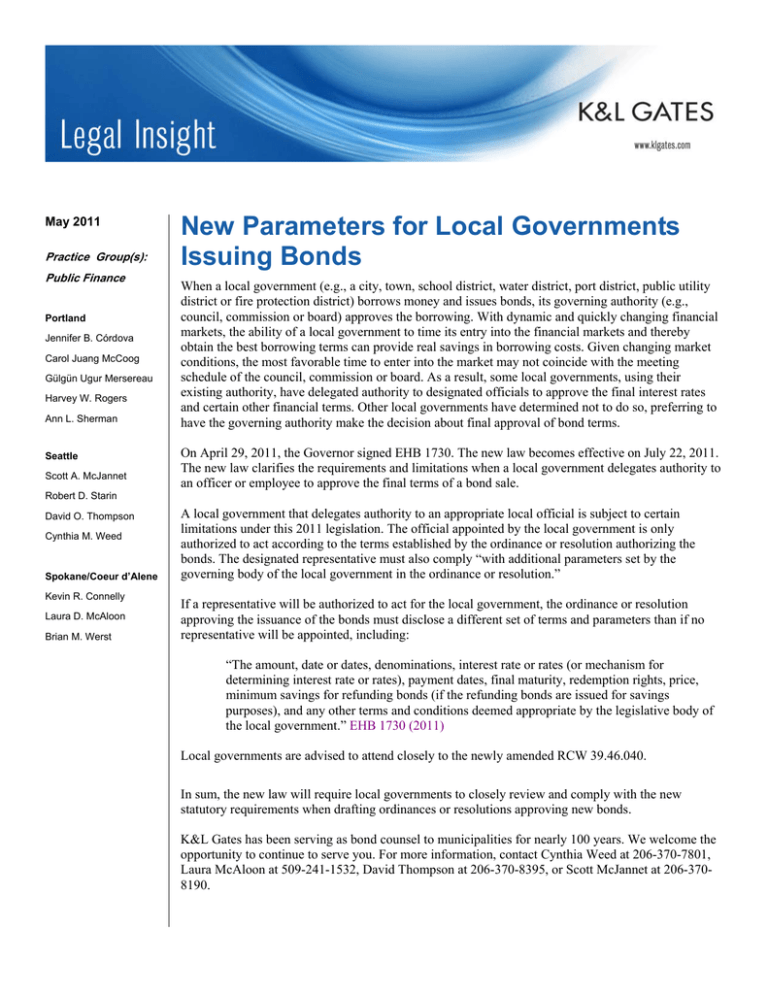New Parameters for Local Governments Issuing Bonds
advertisement

May 2011 Practice Group(s): Public Finance Portland Jennifer B. Córdova Carol Juang McCoog Gülgün Ugur Mersereau Harvey W. Rogers Ann L. Sherman Seattle Scott A. McJannet New Parameters for Local Governments Issuing Bonds When a local government (e.g., a city, town, school district, water district, port district, public utility district or fire protection district) borrows money and issues bonds, its governing authority (e.g., council, commission or board) approves the borrowing. With dynamic and quickly changing financial markets, the ability of a local government to time its entry into the financial markets and thereby obtain the best borrowing terms can provide real savings in borrowing costs. Given changing market conditions, the most favorable time to enter into the market may not coincide with the meeting schedule of the council, commission or board. As a result, some local governments, using their existing authority, have delegated authority to designated officials to approve the final interest rates and certain other financial terms. Other local governments have determined not to do so, preferring to have the governing authority make the decision about final approval of bond terms. On April 29, 2011, the Governor signed EHB 1730. The new law becomes effective on July 22, 2011. The new law clarifies the requirements and limitations when a local government delegates authority to an officer or employee to approve the final terms of a bond sale. Robert D. Starin David O. Thompson Cynthia M. Weed Spokane/Coeur d’Alene Kevin R. Connelly Laura D. McAloon Brian M. Werst A local government that delegates authority to an appropriate local official is subject to certain limitations under this 2011 legislation. The official appointed by the local government is only authorized to act according to the terms established by the ordinance or resolution authorizing the bonds. The designated representative must also comply “with additional parameters set by the governing body of the local government in the ordinance or resolution.” If a representative will be authorized to act for the local government, the ordinance or resolution approving the issuance of the bonds must disclose a different set of terms and parameters than if no representative will be appointed, including: “The amount, date or dates, denominations, interest rate or rates (or mechanism for determining interest rate or rates), payment dates, final maturity, redemption rights, price, minimum savings for refunding bonds (if the refunding bonds are issued for savings purposes), and any other terms and conditions deemed appropriate by the legislative body of the local government.” EHB 1730 (2011) Local governments are advised to attend closely to the newly amended RCW 39.46.040. In sum, the new law will require local governments to closely review and comply with the new statutory requirements when drafting ordinances or resolutions approving new bonds. K&L Gates has been serving as bond counsel to municipalities for nearly 100 years. We welcome the opportunity to continue to serve you. For more information, contact Cynthia Weed at 206-370-7801, Laura McAloon at 509-241-1532, David Thompson at 206-370-8395, or Scott McJannet at 206-3708190. New Parameters for Local Governments Issuing Bonds Authors: Cynthia M. Weed Cynthia.weed@klgates.com +1.206.370.7801 Laura D. McAloon Laura.mcaloon@klgates.com +1.509.241.1532 David O. Thompson David.thompson@klgates.com +1.206.370.8395 Scott A. McJannet Scott.mcjannet@klgates.com +1.206.370.8190 2





